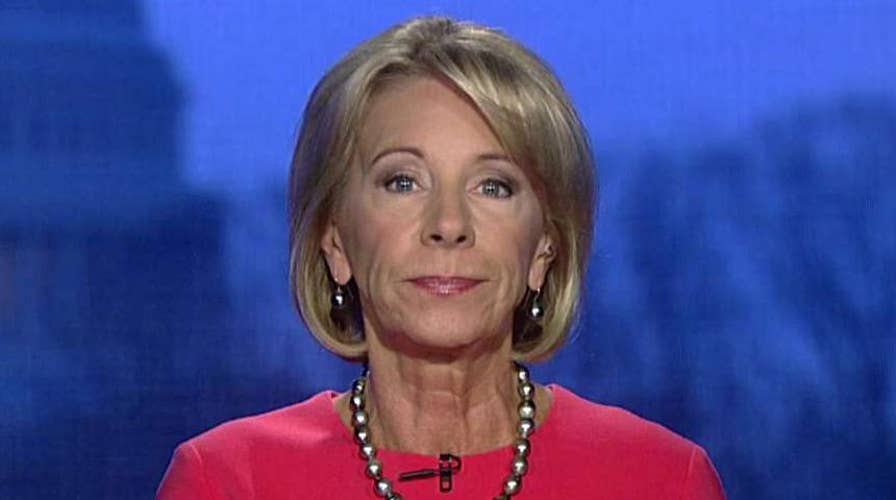DeVos on White House unveiling new school safety guidelines
Secretary of Education DeVos to chair a commission on school safety.
After Education Secretary Betsy DeVos’s appearance on CBS’s “60 Minutes” on Sunday night, progressive media outlets and personalities mocked her performance as “trainwreck” saying that she “stumbled,” “struggled,” and “stunk up” the interview.
Although Secretary DeVos did struggle to answer some questions on the spot, the substance and tone of the criticisms are inaccurate and unfair.
None of this should be surprising. Secretary DeVos, a Christian grandmother and philanthropist who has spent her career trying to improve the quality of education for poor children, has been criticized and mocked relentlessly. And she is the only Cabinet secretary who travels with a cadre of U. S. Marshals because of death threats she’s received.
So why, as “60 Minutes”’ Lesley Stahl put it, has Secretary DeVos become the “most hated Cabinet secretary?”
One reason—as opinion pieces in the New York Times and Wall Street Journal have argued—is that some of the Democratic party’s most deep-pocketed and powerful interest groups are teachers’ unions who realize that they will no longer have a near-monopoly on education.
Another reason, as the New York Times’ Ross Douthat argued, is that the Democratic party’s upper-middle-class suburbanite constituency - who are big supporters, in theory, of public education – bristle at the idea of DeVos’ charters and vouchers being attractive to poor and minority families (who in their view belong in public schools) or families with ideological or religious convictions that differ from their own.
On second thought, I guess it’s not so hard to understand why the left’s hard-core education bureaucracy is so opposed to her. She is a serious threat to the status quo that has served them – if not students – so well.
Perhaps the most significant reason, however, is the one Secretary DeVos gave in response to Stahl’s question: more than anything else, she is misunderstood.
To clear up any misunderstanding caused by the left’s holy war against her, here are four things Americans should understand about Secretary DeVos’ educational vision:
First, as she noted in the “60 Minutes” interview, Secretary DeVos wants to liberate American education from encroachment by federal bureaucracy. Under the Obama administration, the federal government functioned as a giant octopus, bypassing families, communities, and states in order to reach its tentacles into school curriculum, teacher evaluation, values conformity, and even restroom policies. Betsy DeVos signals a departure from that era. Her stated educational philosophy suggests that she will not turn Democratic encroachment into Republican encroachment; instead, she will reduce federal encroachment in order to empower families, local communities, and states.
Second, Secretary DeVos emphasizes freedom of thought. During her confirmation hearings, the media made much ado about her “Dutch Calvinist” religious views. But Dutch Calvinism is a rich religious tradition that emphasizes the rights and freedoms of families, communities, and religions. For that reason, it finds adherents on the right and on the left. Additionally, it places an especially high value on education, but emphasizes that a plural society should be tolerant enough to allow diverse families and communities to build their own educational institutions and choose which institution(s) their children can attend. Unfortunately, many liberal educators are quite illiberal, unwilling to tolerate any type of educational diversity that undermines the federal government’s impulse toward command-and-control.
Third, she wants to empower financially-disadvantaged families to send their children to whichever school they deem best. Under the current system, the government taxes citizens in order to provide education, but then dictates and determines how the tax money can be used. The message is clear: the federal government—rather than the family or local community—is responsible for shaping the way a child understands and interprets the world.
Under Secretary DeVos’ system of vouchers and charters, however, citizens will be able to exercise more influence over their own child’s education. They will also be able to send their children to a wider variety of schools, including those that would have been financially prohibitive without the vouchers. This sort of system is supported by prominent intellectuals and educators such as Anthony Bradley and has been supported in the past by Democratic politicians such as Cory Booker.
Fourth, Secretary Devos does not come to her job as a career politician or an educational ideologue. She comes as a lifelong education advocate and philanthropist who has given tens of millions of dollars to public and private educational institutions.
As her “60 Minutes” interview made clear, Secretary DeVos is an imperfect Secretary of Education, as all secretaries of education have been. She is neither a career politician nor a pundit.
What she is is a skilled educational advocate and a lifelong educational philanthropist whose vision for education could reduce bureaucracy, increase free thinking, and empower the financially disadvantaged, thus helping children to get the education they deserve.
On second thought, I guess it’s not so hard to understand why the left’s hard-core education bureaucracy is so opposed to her. She is a serious threat to the status quo that has served them – if not students – so well.
Good-thinking Americans on the left and right should reject the mainstream media narrative and pull for Secretary DeVos as she tries to reform and shake up these aspects of our nations’ educational system.








































